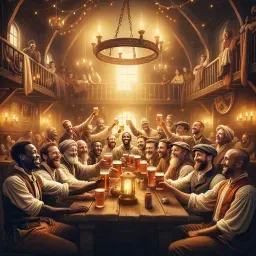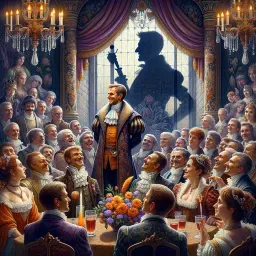”know what were good to do, chapels had been churches, and poor men'
s cottages princes' palaces“

0
0
0
0
- Meaning
- The phrase expresses the moral dilemma and the contrast between knowing what is right and actually doing it. It reflects on the idea that if acting on virtuous thoughts were as simple as having them, then humble places (like chapels and cottages) would be grand and elevated to the status of more illustrious buildings (like churches and palaces). This underscores the disparity between intention and action, pointing out how often good intentions remain unfulfilled.
- Allegory
- The image elements include the humble cottage and lush gardens to symbolize the beauty and potential of humble virtues acted upon. The grand but barren palace represents the grandeur of high intentions left unfulfilled. The crossroad is a metaphor for the choice individuals face between just knowing what is good and actually doing it. The person at the intersection embodies the internal struggle and decision-making process. The warm lighting over the cottage versus the cold illumination of the palace underscores the contrast between fulfilling action and empty intention. These elements combine to visually express the significance of turning ethical knowledge into practical deeds.
- Applicability
- This teaching can be applied in personal life by emphasizing the importance of action. It reminds us that having good intentions and knowing the right thing to do is not enough; one must also take the necessary steps to act on those intentions. Whether in personal development, helping others, or making ethical decisions, the phrase emphasizes that actions speak louder than thoughts or words.
- Impact
- This phrase, like many of Shakespeare’s works, resonates widely because it taps into a universal human experience: the gap between intention and action. It has inspired discussions in literature, philosophy, and ethics about the nature of good intentions and the challenges of moral action. Shakespeare's work continues to be studied and performed worldwide, emphasizing its lasting impact on culture and society.
- Historical Context
- "Measure for Measure" was written around 1603-1604 during the early 17th century. This was a time of significant political and social tension in England, under the rule of King James I. The themes in the play often reflect concerns about justice, morality, and the complexities of human conduct.
- Criticisms
- Some criticisms might arise from the pessimistic view it offers on human action, suggesting that good intentions often go unrealized. Additionally, some interpretations can argue that it underscores a disparity that might lead to fatalism, where people may feel discouraged from attempting good deeds due to perceived efficacy.
- Variations
- The core dilemma of knowing versus doing can also be found in various philosophical and religious traditions. For instance, in Buddhism, the emphasis on right action (one of the steps on the Eightfold Path) reflects a similar acknowledgment that ethical knowledge must be put into practice. Similarly, in Confucianism, moral understanding is seen as incomplete without corresponding action.
-

To weep is to make less the depth of grief.
-

If to do were as easy as to.
-

If to do were as easy as to know what were good to do, chapels had been churches, and poor men's cottages princes' palaces.
-

To do a great right do a little wrong.
-

Come, gentlemen, I hope we shall drink down all unkindness.
-

I am a man more sinned against than sinning.
-

Some rise by sin, and some by virtue fall.
-

There is nothing either good or bad but thinking makes it so.
-

There's daggers in men's smiles.
-

I must be cruel, only to be kind.
-

Things without all remedy should be without regard: what's done is done.
-

To be, or not to be, that is the question.
No Comments